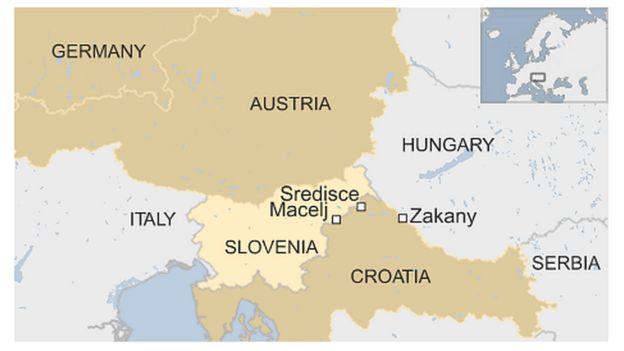Slovenia's army will help police deal with thousands of migrants expected to arrive from Croatia in the coming days, Prime Minister Miro Cerar says.
His announcement came as hundreds of migrants began arriving on its borders with Croatia - a day after Hungary closed its frontier with Croatia.
Many of the migrants aim to continue north to Austria and Germany.
More than 600,000 migrants have reached the EU by sea so far this year, many travelling from Turkey to Greece.
However more than 3,000 have perished trying to cross the Mediterranean. Many migrants are Syrians fleeing the civil conflict there.

Slovenia's Prime Minister Miro Cerar said the government had decided "to include the army in helping police".
He was speaking after a meeting of the country's National Security Council.
Throughout the morning, some 600 refugees at a reception centre near Croatia's border with Serbia were bussed to two border crossings into Slovenia.
The UN refugee agency said they were being registered by police and taken to a refugee camp close to the Austrian border.
"For now (the procedure) is running really smoothly. Unlike other countries, Slovenia had time to prepare... It's not perfect, but things are moving," UNHCR spokeswoman Caroline van Buren told the AFP news agency.
A train carrying 1,800 migrants later arrived at the Croatian town of Cakovec, close to the Slovenian border. Six hundred will board buses to two separate border crossings, while the rest will remain on the train to another two border crossings, the BBC's Guy Delauney reports.
At the scene: BBC's Guy Delauney in Croatia
The quiet Croatian town of Cakovec is preparing for a new role - as a railhead for refugees.
Thousands of them are expected to come through here in the coming days, following Hungary's completion of a fence along its border with Croatia. Now as many as 5,000 people a day will have to use an alternative route into the Schengen area.
They will arrive by train from reception areas close to Croatia's border with Serbia. Then they will be split into groups. Some will go by bus to the border crossing with Slovenia at Macelj. But the majority will travel on by train to another crossing at Sredisce ob Dravi.
Red Cross and UNHCR workers welcomed those who arrived on Saturday afternoon - as an already long journey has become that little bit more complicated.
Can deeds match words?: The challenges ahead for the EU and Turkey
The pull of Europe: Five migrant stories
Merkel under pressure: Chancellor's migrant policy faces criticism at home
Focus on Turkey: Why the EU views Syria's northern neighbour as key
Crisis in graphics: Migration numbers explained
As well as bringing in the army, Slovenia, a nation of some two million people, has deployed extra police to its border areas and stopped all passenger rail transport from Croatia.
But Slovenian Interior Minister Vesna Gjorkos Znidar earlier said the country would keep accepting refugees as long as Austria and Germany's borders remain open.
The past month has seen some 3,000 migrants pass through Slovenia, Reuters news agency reported. Slovenia has said it was in a position to accommodate up to 8,000 migrants per day.
 Image copyrightAFP
Image copyrightAFP Image copyrightReuters
Image copyrightReuters Image copyrightAP
Image copyrightAPSome 5,000 to 8,000 people were being allowed across Hungary every day, without registration, bound for Austria.
But late on Friday, several hundred migrants became the last to pass from Croatia into Hungary at the border village of Zakany. "Closure!" a soldier shouted after they passed across.
Hungary said it shut the border with Croatia after European Union leaders failed to agree its plan to send a force to prevent migrants reaching Greece.
Hungary's closure of its border with Croatia comes just a month after it shut its frontier with Serbia, which was another transit route to Western Europe.
Hungarian Foreign Minister Peter Szijjarto said border controls with Slovenia would be temporarily reinstated to safeguard Hungary from a "mass wave of unidentified, uncontrolled migrants."
Hungary and Slovenia are both part of the passport-free Schengen zone, but Croatia is not.
Croatia's Interior Minister, Ranko Ostojic, said his country was "turning the route, the corridor, towards Slovenia".
But it had not struck any agreement with Slovenia, according to Mr Ostojic. "This is (purely) a Croatian plan."
Slovenia's army will help police deal with thousands of migrants expected to arrive from Croatia in the coming days, Prime Minister Miro Cerar says.
His announcement came as hundreds of migrants began arriving on its borders with Croatia - a day after Hungary closed its frontier with Croatia.
Many of the migrants aim to continue north to Austria and Germany.
More than 600,000 migrants have reached the EU by sea so far this year, many travelling from Turkey to Greece.
However more than 3,000 have perished trying to cross the Mediterranean. Many migrants are Syrians fleeing the civil conflict there.

Slovenia's Prime Minister Miro Cerar said the government had decided "to include the army in helping police".
He was speaking after a meeting of the country's National Security Council.
Throughout the morning, some 600 refugees at a reception centre near Croatia's border with Serbia were bussed to two border crossings into Slovenia.
The UN refugee agency said they were being registered by police and taken to a refugee camp close to the Austrian border.
"For now (the procedure) is running really smoothly. Unlike other countries, Slovenia had time to prepare... It's not perfect, but things are moving," UNHCR spokeswoman Caroline van Buren told the AFP news agency.
A train carrying 1,800 migrants later arrived at the Croatian town of Cakovec, close to the Slovenian border. Six hundred will board buses to two separate border crossings, while the rest will remain on the train to another two border crossings, the BBC's Guy Delauney reports.
At the scene: BBC's Guy Delauney in Croatia
The quiet Croatian town of Cakovec is preparing for a new role - as a railhead for refugees.
Thousands of them are expected to come through here in the coming days, following Hungary's completion of a fence along its border with Croatia. Now as many as 5,000 people a day will have to use an alternative route into the Schengen area.
They will arrive by train from reception areas close to Croatia's border with Serbia. Then they will be split into groups. Some will go by bus to the border crossing with Slovenia at Macelj. But the majority will travel on by train to another crossing at Sredisce ob Dravi.
Red Cross and UNHCR workers welcomed those who arrived on Saturday afternoon - as an already long journey has become that little bit more complicated.
Can deeds match words?: The challenges ahead for the EU and Turkey
The pull of Europe: Five migrant stories
Merkel under pressure: Chancellor's migrant policy faces criticism at home
Focus on Turkey: Why the EU views Syria's northern neighbour as key
Crisis in graphics: Migration numbers explained
As well as bringing in the army, Slovenia, a nation of some two million people, has deployed extra police to its border areas and stopped all passenger rail transport from Croatia.
But Slovenian Interior Minister Vesna Gjorkos Znidar earlier said the country would keep accepting refugees as long as Austria and Germany's borders remain open.
The past month has seen some 3,000 migrants pass through Slovenia, Reuters news agency reported. Slovenia has said it was in a position to accommodate up to 8,000 migrants per day.
 Image copyrightAFP
Image copyrightAFP Image copyrightReuters
Image copyrightReuters Image copyrightAP
Image copyrightAPSome 5,000 to 8,000 people were being allowed across Hungary every day, without registration, bound for Austria.
But late on Friday, several hundred migrants became the last to pass from Croatia into Hungary at the border village of Zakany. "Closure!" a soldier shouted after they passed across.
Hungary said it shut the border with Croatia after European Union leaders failed to agree its plan to send a force to prevent migrants reaching Greece.
Hungary's closure of its border with Croatia comes just a month after it shut its frontier with Serbia, which was another transit route to Western Europe.
Hungarian Foreign Minister Peter Szijjarto said border controls with Slovenia would be temporarily reinstated to safeguard Hungary from a "mass wave of unidentified, uncontrolled migrants."
Hungary and Slovenia are both part of the passport-free Schengen zone, but Croatia is not.
Croatia's Interior Minister, Ranko Ostojic, said his country was "turning the route, the corridor, towards Slovenia".
But it had not struck any agreement with Slovenia, according to Mr Ostojic. "This is (purely) a Croatian plan."



